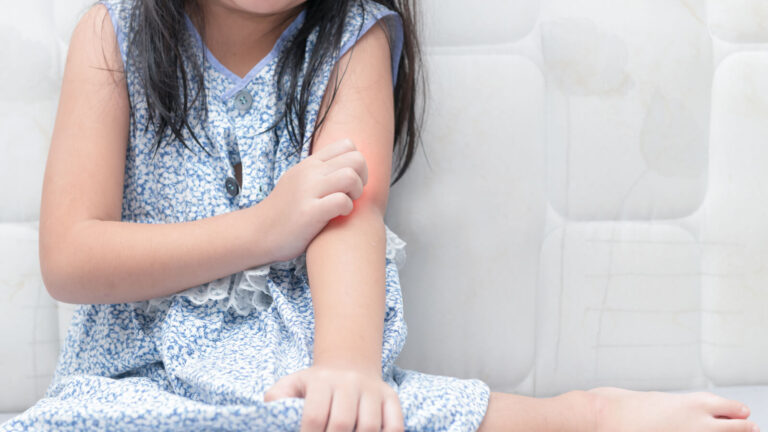MEDIA/
Childhood Eczema

Childhood illnesses vary widely, and parents may often overlook their children’s skin conditions. However, Dr. Chan Shang-Hei, a dermatologist at St. Teresa’s Hospital, points out that childhood eczema can range from mild to severe, with serious cases potentially affecting a child’s focus in learning and social development. Proper prevention, skincare, and treatment can significantly reduce eczema symptoms. Over half of children with eczema may completely outgrow it by the age of 13, with no recurrence.
Genetics and Environmental Triggers of Eczema
To better understand childhood eczema, it’s important to first grasp its causes. Dr. Chan explains that genetics is a significant factor. Mutations in the filaggrin gene can affect the structure of skin lipids, weakening the skin’s barrier function and leading to eczema. If one parent has eczema, the child has a 25% chance of developing it; if both parents are affected, the risk increases to 40%.
Additionally, environmental factors play a major role. Dust mites, pollen, mold, and pet dander can easily trigger skin sensitivities. Furthermore, damage to the skin’s outer layer indicates a loss of barrier protection, which accelerates moisture loss and can trigger eczema.
Efficacy of Steroid Treatments
Eczema treatment generally falls into two categories: topical and oral. Common topical medications include steroid creams, calcineurin inhibitors, and antibiotic creams. Oral treatments often involve antihistamines, antibiotics, and oral steroids. Dr. Chan notes that steroid creams are very effective for treating eczema, but many parents fear using them for their children, leading to reduced application and diminished treatment efficacy. As long as they follow the doctor’s instructions, parents can safely use steroid creams.
Combining Moisturizers for Enhanced Treatment
Using moisturizers is not just for beauty enthusiasts; choosing the right moisturizer can aid in eczema treatment. Dr. Chan states that moisturizers can be effective for mild eczema and help prevent flare-ups.
Daily Care to Prevent Eczema
In addition to treatment, moisturizers play a crucial role in daily skincare. Dr. Chan recommends applying moisturizer within three minutes after bathing to enhance barrier protection and prevent moisture loss.
Choosing the Right Moisturizer for Itch Relief
Moisturizers can indeed be beneficial for treating eczema, particularly in soothing itchiness. “When eczema flares up, it can be extremely itchy and may appear on various parts of the body. Sometimes, children will scratch their itchy skin until it bleeds, preferring pain over itchiness, which can be distressing for parents,” Dr. Chan explains. Thus, using moisturizers not only alleviates the physical symptoms but also helps soothe the emotional distress of afflicted children.
With so many moisturizer options available, how should parents choose? “The key is to find a product that the child is willing to use!” Dr. Chan advises. There are various levels of greasiness in moisturizers, and patients need to use them daily. Depending on the condition, application may be required twice a day or even more. If a moisturizer is too greasy or sticky, children may be reluctant to use it, defeating the purpose of the product.
Moreover, parents should look for products with fewer irritants and preservatives. If a product causes a stinging sensation, it should be discontinued. Some ingredients, like licorice extract, can also effectively relieve itching and reduce eczema symptoms.


